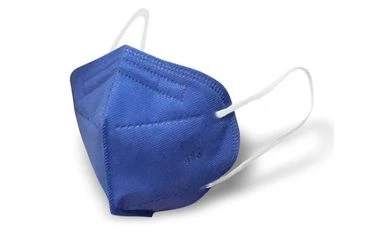A new study reported that a common type of N95 respirator reprocessed with VHP maintained its function and effectiveness through 25 cycles of re-use.
The research has been published in the 'American Journal of Infection Control'.
"The findings from our study expand upon previous findings and show that VHP is a relatively safe method for reprocessing N95 respirators and could help address shortages in future epidemics," said lead author Christina F. Yen, MD, who was a fellow in medicine at BIDMC during the research and is now at the University of Texas, Southwestern.
"It is important that we now find ways to scale and translate this disinfection capability to smaller hospitals and resource-limited healthcare settings that could benefit just as much - perhaps more - from this type of personal protective equipment reprocessing in future disaster scenarios," she added.
Yen and colleagues conducted a series of qualitative and quantitative tests to evaluate both the function and effectiveness of seven N95 respirators that were used by three male and four female volunteers from June to August of 2020. These tests comprised a user seal check (performed by subjects donning and doffing the respirators), qualitative and quantitative respirator fit testing, and filtration efficiency testing, which assesses the ability of the respirator to filter out particles.
Even after 25 decontamination cycles, the researchers found no changes in respiratory integrity or filtration efficiency among the seven N95 respirators. All seven N95 respirators met the primary endpoints of function and effectiveness, passing 25 user seal checks and eight quantitative and four qualitative fit tests, in addition to maintaining filtration efficiencies of 95 per cent or above throughout the study.
Yen and colleagues noted that successful, large-scale implementation of N95 respirator reprocessing requires planning and coordination, multidisciplinary teams to ensure disinfection efficacy and end-user safety, and significant logistical support.
Also Read
"In order for reprocessing to be a realistic option for healthcare facilities, certain steps need to be taken," said senior author Preeti Mehrotra, MD, MPH, senior medical director of Infection Control at BIDMC.
"Reprocessing can be made possible by creating relationships among infection prevention, occupational health, environmental services, and other relevant departments within hospitals to facilitate implementation of appropriate technologies and advocating for the inclusion of personal protective equipment reprocessing in epidemic and pandemic planning," she added.
Co-authors included Robert Seeley, MS, CSP, Patrick Gordon, DNP, RN, CIC, Sharon B. Wright, MD, MPH, Dana Pepe, MD, MPH of BIDMC; and Lalitha Parameswaran, PhD of Massachusetts Institute of Technology, Lincoln Laboratory.
(Only the headline and picture of this report may have been reworked by the Business Standard staff; the rest of the content is auto-generated from a syndicated feed.)
)